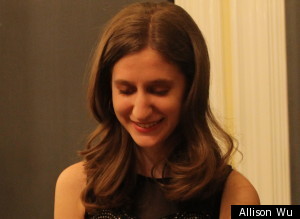
This January, teen author Ilana Greenstein published her book, Searching for Solace: Dealing with My Father's Suicide. To gain insight into the publication process and the life of a teen author, I sat down with Greenstein and discussed her past, present, and future connections to writing.
Allison Wu: How did you become interested in writing to begin with?
Iliana Greenstein: I've been writing for as long as I can remember. I started my journal at the beginning of second grade, and I have written in it ever since then, taking breaks every once in a while. After my dad died I started writing a lot more frequently than I had in the past since I had more emotions and feelings to work through.
AW: How have you developed your writing over the years?
IG: In elementary school my journal entries were superficial and light-hearted; I'd write about what happened at school that day, or what my parents had said to me when I got home from school. As I got older and my emotions started to mature, my journal entries became darker and more complex. I'd describe what happened during the day, but then I'd go deeper and inquire about why those things happened: "Why did she say that to me?' 'What caused me to react in that way?" etc. I began to use the process of writing to gain insight into the characters of people around me, and eventually myself.
AW: What does the process of writing feel like to you?
IG: For me, writing is the ultimate form of liberation. I can finally let out everything I have been keeping in all day and begin to understand what happened and why it happened. After I write, I feel a sense of calmness and completeness that I don't get from anything else.
AW: What's your book about?
IG: My book consists of journal entries from the year following my dad's suicide. It's about everything I went through in that year -- day-to-day events, my thoughts, my feelings, and my struggle to accept the situation and move on from it. I also added prompt pages related to my journal entries so readers can begin to go through their own healing process if they have experienced something similar to me.
AW: What challenges did you encounter and how did you overcome them?
IG: The biggest challenge for me was the idea of putting my innermost feelings out there for everyone to read. I didn't seek publication; the journal was only intended for me. When my mom's friend, a publisher, asked if she could read a portion of my journal, I was very hesitant. But then I started to think, "What if reading my journal could help even one kid going through something like me deal with his or her situation a little bit better?" Or maybe even if someone was considering going down the same path as my dad; what if reading my journal could stop him or her from doing that? With that in mind, I gave my mom's friend some journal entries to read, and she was interested in publishing them. The whole process was really difficult, and I doubted my decision to publish my journal several times. But I'd always go back to thinking about how it might actually be able to help other kids, and I know I made the right choice.
AW: What was the most exciting stage of the whole process?
IG: Designing the cover was really fun. My friend and I did a photo shoot outside for the cover picture, and it was freezing cold, but we had a great time because we knew one of those pictures was going to end up on the cover of my book! Seeing the picture on the cover was as exciting for her as it was for me because she was able to publish her photography.
AW: What's the next move you'll make in your writing career?
IG: I'm not planning on pursuing a career as a writer, but I would love to become an English teacher and maybe write on the side. I want to show other kids how writing can be therapeutic and transforming, but also teach them that reading other people's work can have just as great an impact.
AW: What advice do you have to other teens who want to write a book?
IG: I tried to publish my first book when I was seven years old; I received a friendly rejection letter, cried for a little while, and then said, "Well, my next book is going to be even better!" I think you just have to keep writing and don't give up on yourself. Dr. Seuss' first book that he published and illustrated was rejected by 27 publishing companies before it became published! Just because one person or even 100 people don't like something you write doesn't mean it's not an amazing piece of writing that could be really special for certain people. You just have to keep looking until you find those people, because they're definitely out there.
AW: How can readers purchase a copy of your book?
IG: The book is available on the Innerchoice Publishing website, under the self-understanding category. I can also send signed copies to you, if you email searchingforsolace2012@gmail.com.
AW: If readers have questions for you, how can they contact you?
IG: Please feel free to get in touch with me with any questions or comments; I really want to be there for readers if they feel that talking to me could help them in addition to reading the book. My email is searchingforsolace2012@gmail.com.
